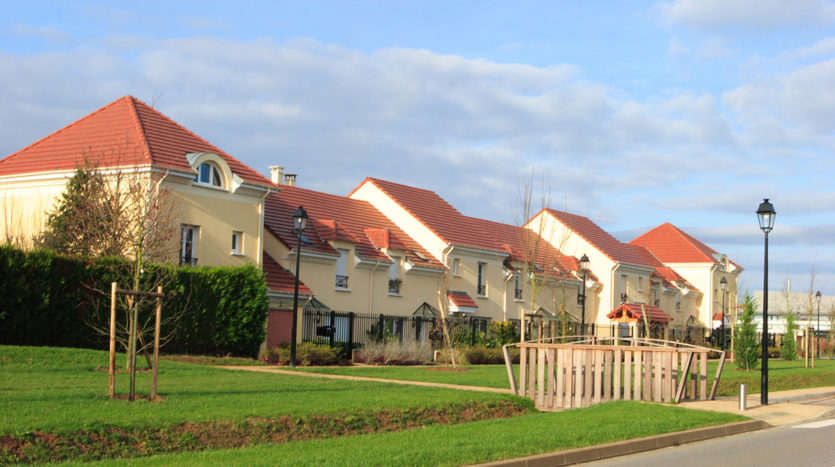Buying a terraced or semi-detached house: a good idea?
If you’re looking for your future home, the question has certainly arisen: are you going to exclude terraced houses from your search, or include them? The answer is not so obvious, and while everyone will tend to prefer a detached house, there are good reasons – budgetary or thermal, for example – why terraced houses have certain qualities that should not be overlooked.
To clarify your analysis, here are the factors to consider when deciding whether buying a terraced house is really a good idea for you.
Detached houses: why choose them?
Let’s start by looking at the main reason why many buyers insist on a detached house: privacy. Depending on the size of the plot around the house, neighbours can be several hundred metres away.
In addition to this essential benefit, you may also enjoy greater architectural freedom when designing or renovating your home, and as a general rule, a larger garden.
But these advantages can be counterbalanced by a number of arguments that make detached houses rather restrictive, while at the same time conferring just as many advantages on semi-detached houses, which we’ll look at in more detail later. Generally speaking, a detached house :
- Is easier to break into because there are no close neighbours,
- Is less easy to heat,
- Can reduce social ties with neighbours,
- Is more expensive to buy and maintain.
What is a “semi-detached house”?
Article 653 of the French Civil Code defines semi-detached and terraced house as follows: “any wall separating buildings […] courtyards and gardens, and even enclosures in fields, is presumed to be common”. This means that two neighbouring properties share a common wall.
In addition to sharing a wall, terraced houses are often drawn on the same plans and have the same design, in which case one is the mirror image of the other. The foundations may also be shared. All of these features have certain disadvantages, just like those of a detached house.
The disadvantages of semi-detached houses
Each house has its own architecture and context. The most common disadvantages may be found in some houses, but not in others.
Noise
If the floor slab is shared, ground vibrations may tend to resonate from one house to the next. Also, if the party wall is not sufficiently insulated, sound can pass through and cause discomfort. Finally, the proximity of gardens, where they exist, limits outdoor privacy.
Safety and security
On the technical side, it is desirable that both properties are maintained in the best possible way so as not to harm the other, in the structural part. In an extreme case that has recently occurred in several large towns, the collapse of one property could cause the neighbouring house to collapse.
Fire safety is also something to keep an eye on, because obviously a disaster could potentially affect both houses. It’s always a good idea to check that your neighbour’s home is equipped with detectors and other alarm systems.
Loss of privacy
Apart from the perceptible noise, living next door to your neighbours is a conscious choice that may not suit everyone. Neighbours are inevitably omnipresent, and even if relations are cordial or even friendly, this proximity can be oppressive for some people.
Advantages not to be overlooked
When they are well designed, some of the disadvantages of terraced houses can be erased or even added to the list of qualities that you can find in them.
Greater security
There are a number of aspects that make a terraced house more secure, as long as good neighbourly relations are based on goodwill. We mentioned the state of the houses and the risk of fire, which means that more people will be able to keep an eye on them and sound the alarm if necessary.
Also, the risk of burglary is reduced by the proximity of people who are likely to be on the lookout for malicious acts.
A richer neighbourhood life
For people who are keen to socialise, a terraced house means more opportunities to meet up with neighbours and interact with each other. This can be an opportunity to do each other favours or exchange news more easily.
Less maintenance
By sharing certain walls and part of the roof with the neighbouring house, the burden and costs of exterior maintenance are mechanically reduced.
Potentially lower purchase costs
For the same surface area and location, terraced houses are often cheaper to buy than detached houses, and this is true from the moment they are built, because the costs of the elevation and the land are shared between the neighbouring owners.
Lower energy costs
Lastly, by taking advantage of the protection afforded by neighbouring houses and their heating systems, terraced houses reduce energy requirements and therefore energy bills.
In the final analysis, terraced housing is a choice that should be made consciously and on a case-by-case basis, with the necessary hindsight on all the points mentioned. Where appropriate, it’s all the more useful to get to know the neighbours during the first visits, to avoid buying a property close to people who don’t share the same lifestyle: neighbourhood problems are common and can spoil the joy of moving in.


